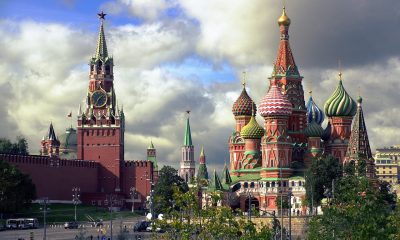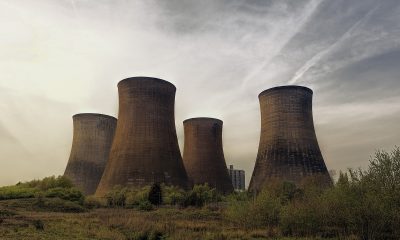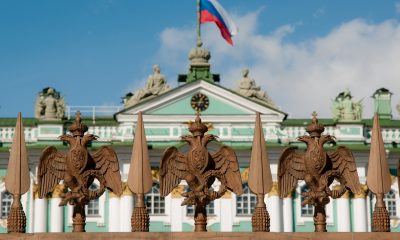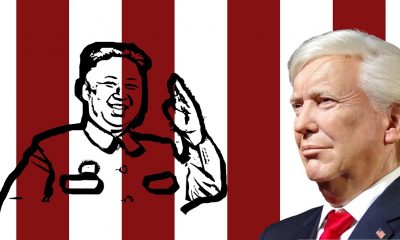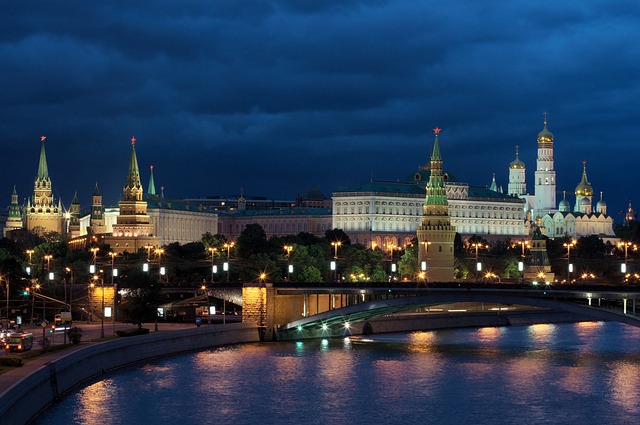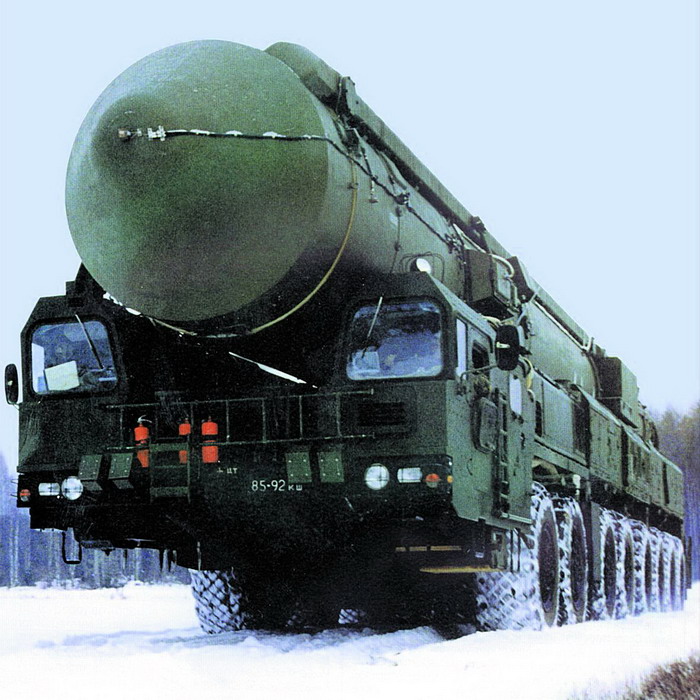
Source: Public Domain
Even though everyone recognizes nuclear weapons to be the most dangerous and dreadful weapons ever created, even though a lot of political leaders have acknowledged and continue to remind us that nuclear weapons are not to be used again, they still exist and therefore countries keep contemplating whether to pursue a nuclear policy. Despite the growing role of international law and diplomatic negotiations, international peace has not been reached, and the possibility of an armed conflict remains. Thus, military power continues to be relied upon as it defines a country’s status on the world stage. Having nuclear weapons strengthens this status. It plays the role of deterrence and provides a significant superiority of the country over its opponents.
The current Russian nuclear policy is driven by several reasons. Firstly, nuclear weapons guarantee country’s protection from the foreign broad scale aggression and ensure its security and sovereignty. Secondly, they are the key element in strategic deterrence. Thirdly, they preserve the high status of the Russian Federation at the world arena. Moreover, nuclear strength gives the country an ability to equalize itself with the main opponent, the US.
In the light of recent events in Ukraine, nuclear rhetoric has returned to the language of the politicians. In August 2014, president of Russia, Vladimir Putin stated in the interviews, “Our partners, notwithstanding the situation in the countries or their foreign policies, should always remember that it is better not to mess with Russia. I’ll remind you that Russia is one of the largest nuclear powers. These are not just words, this is reality and, moreover, we are strengthening our powers of nuclear restraint” [1]. He continued by saying that Russia was transforming its armed services, making them more efficient and modern. Subsequently, later in November at the Forum of the National Peoples’ Front (rus. Obsherossiyskyi Narodnyi Front) he stated that the US wanted to subdue Russia. He also mentioned Nikita Khrushchev, highlighting his quick temper, “[He] hammered the desk with his shoe at the United Nations. And the whole world, primarily the United States, and NATO thought: this Nikita is best left alone, he might just go and fire a missile” [2]. Even more media hype was caused by the documentary “Crimea. The Way Home” (rus. Krym. Put na Rodinu). In one of the interviews Putin was asked whether the nuclear weapons were alerted during the annexation of Crimea, his answer was that thought had crossed their mind [3]. In November 2015 there was a state TV “leak” that demonstrated giant nuclear torpedo. Many commentators, both Russian and foreign, claimed that it was deliberate action and qualified it as a warning to the United States not to seek nuclear advantage [4]. The Ukrainian crisis has indeed ignited the political and military tension.
Such “nuclear” statements have been understood rather ambiguously by the West. The officials of NATO and the US repeatedly stated that they did not consider military intervention in Ukraine. It is, however, unclear whether such reaction was caused by the Russian nuclear warnings. Obviously, intervention was not an option, considering possible nuclear escalation.
In comparison to 1970-1980, there were many declarations from both sides (the US and USSR) about the impossibility of a nuclear war. Current Russian position cannot be different, yet officially Moscow remains silent. Technically, Russian nuclear rhetoric does not contradict the aims to prevent nuclear war in terms of deterrence strategy and armed-control treaties. However, it is obvious that Russia acts rather provocative.
Interestingly, following these renewed nuclear references, this nuclear rush was supported by many domestic officials. The political parties who have a long history of opposite views have united after the incident with Crimea. Some extreme supporters suggested adding into the official military doctrine the direct use of nuclear weapons in case of local war. In their opinion, it would be “preventive measures”, “demonstration of determination”, and “preventing the escalation of the situation” [5]. Nevertheless, their claims have remained idle.
The new edited version of the military doctrine was issued in December 2014. It does not reflect these radical views and reiterates the same moderate and clear political views as in the previous versions of 2000 and 2010, “The Russian Federation will reserve the right to use nuclear weapons in a situation when nuclear weapons and other kinds of weapons of mass-destruction are being used against it and (or) its allies and also against a large scale aggression with conventional weapons in a crisis situation where the national security of the Russian Federation is at stake” [6]. It is obvious that it was driven by the fact that nuclear weapons are to be used under extreme circumstances. In the case of a conflict with another nuclear country, the decision to use nuclear weapon would cause a quick nuclear reaction and escalation of the conflict. In the first days such nuclear strikes would kill millions of people from the both sides, and then it would turn into the global catastrophe. Such a concept of limited nuclear war has always been rejected by Russia.
Certainly, one of the main changes in the military doctrine admits the fact that ideological and interreligious clashes are rising. In the new version it is stated rather carefully “the competition of values and development models”. In the core of any ideological or religious structure lies a system of beliefs, values. Ideological models are based on these values. So such a statement recognizes current ideological competitions in the world. Consequently, the conflict between Russia and the West has a prominent ideological element that reflects the difference of values between the countries.
Another interesting thing has been noted in the edited version of the military doctrine of the Russian Federation, “the activities of information influence towards the national population, especially towards the youth, that aim to erode historical, moral and patriotic values and traditions in the area of homeland defence” [6]. It has been designated as a military threat. Indeed, the topic of “rewriting” the World War II, which is known in Russia as the Great Patriotic War, has been extensively discussed in the Russian media. Moreover, the Polish statements concerning country’s liberation by the [only] Ukrainians caused strong and rather negative public reaction in Russia. It was followed by a strong official response. Subsequently, several classified testimonies of Red Army soldiers who liberated concentration camps were realized. Likewise, the fact that Vladimir Putin was not invited to the memorial festivities that marked the 70th Anniversary of the Great Victory caused public outrage.
Although public opinion might not be the main driving factor for Russian nuclear rise, it certainly might have played a role in consolidating the state’s decision to strengthen its nuclear policy. There is not enough evidence to confirm it, yet the government had a strong national support. In 2015 during the negotiations in Minsk the popularity of the president had reached 75%, the highest level for the last 15 years [7]. The political rhetoric of the Russian president along with the imposed sanctions and the U.S. responsive rhetoric seem to only boost government’s support. Meanwhile, anti-nuclear attitudes are of no consequence at the moment. The same is with the increased military spending; Russian public is being rather supportive.
Russia is spending a lot of money on modernization of its arsenals. Despite the fact that economy has been weakened by the fall in oil prices, the President of the Russian Federation still emphasizes nuclear weapons as a symbol of Russian influence. The reason for that remains the same: balancing the powers. Such conflicts on the borders with Russia, along with other local and regional wars breaking out, its security cannot be fully guaranteed. Under these circumstances, Russia cannot operate only by using diplomatic and economic means to resolve the conflict.
In order to elaborate more on the symbolic meaning of nuclear weapons, it should be noted that after the collapse of the USSR Russia strived to achieve the same influential level and to come back to the global arena as an equal. Default, internal disturbances, the loss of the military advantage, the lost Cold War and the weak leadership in the next years has severely damaged the country’s prestige. It was vital to become a global power again. The nuclear policy has become insurance that it can be accomplished. The Putin’s and Medvedev’s politics fixed the economy and started restoring the country’s military potential. Nuclear weapons have played in significant role in rebuilding its international status.
After the events in Ukraine, for the first time since the Cold War an armed conflict between Russia and the United States has been viewed as highly possible, therefore, posing a threat to the rest of the world. Both countries started to increase their military strength and regularly demonstrate their military power, including strategic armament (started by the US when it deployed two B-2 Spirit stealth bombers to Europe in 2014[1]). The Parade of the 70th anniversary of the Victory in the World War II was another opportunity for the Russian military to present some of its latest equipment. As Vladimir Putin stated in 2012, “We should not tempt anyone by allowing ourselves to be weak. We will, under no circumstances, surrender our strategic deterrent capability. Indeed, we will strengthen it” [8].
The inability to compete with the West on equal terms in conventional terms intensified its nuclear pursuit. Russia prioritized its strategic nuclear forces by introducing new missiles and submarines. Keir Giles, an expert on the Russian armed forces at the Conflict Studies Research Centre, notes that the current military reform was started in 2008, after Russian performance in the war with Georgia” [9].
One of the military experts has expressed similar views about Russia’s conventional forces. The colonel Mikhail Khodarenok (currently an editor of the rather conservative military and political periodicals “Voenno-Promishlennyi Kurier” (eng. Military and Industrial Courier) and “Vosdushno-kosmicheskaya Oborona” (eng. Aerospace Defense)) is a rather famous specialist in the military sphere. In 2015 he wondered whether Russia had any forces that could match NATO forces. He concluded that there was a lack of the newest weapons in Russia. That is why it was vital to avoid military entanglement in the South-East by the Russian Federation. The country, its navy and army, was not ready for the full-scale armed confrontation by using only conventional forces [10].
This opinion roughly corresponds to the statements of the Russian Ministry of Defense[2], for this reason nuclear rhetoric of Moscow makes sense. It is a warning to the US and NATO to stay away from the conflict in Crimea and in the South-East of Ukraine. The political aim is clear. Firstly, other countries should know the importance of the events in the region for the Russian national security interests. Secondly, Moscow is determined to take action while upholding its interests, regardless of whether the West considers its actions legitimate or not.
Perhaps, a particular history of Russia may explain such a current political behaviour. The concept of protecting its national interests and sovereignty as well as maintaining its influence has been formed and consolidated over the centuries through the complex history of conquest and occupation. Lee Blessing in the book “A Walk in the Woods” wrote, “The geography of Russia is … flat, broad plains —open invitations to anyone who wants to attack. Mongols, French, Germans, Poles, Turks, Swedes – anyone” (11). The size of the country and its geography are crucial in the sense of security. Currently Russia borders with 18 countries, including partially recognized Abkhazia and South Ossetia. Among them six countries are NATO members (The Baltic states, Poland, Norway, and USA). Georgia and Ukraine have repeatedly expressed their wish to join the alliance. In general, NATO enlargement into Eastern Europe is often referred by Russia as treachery. The West back in the 90s promised the USSR that it would not expand to the East. Yet, it breached the agreements, undermining the credibility of further promises. No wonder that current NATO enlargement threatens Russian national interests. Meanwhile, given the memory of multiple offences that is stored in the mental cultural heritage does not improve the situation. Current conflicts do not provide necessary relieve, and Russia is forced to protect its borders and its security, especially at a time of deterioration of relations with the West, particularly with the US.
In 2015 at the Nuclear Non-Proliferation Treaty conference in New York Mikhail Ulyanov, the Director of the Department for Non-Proliferation and Arms Control at the Russian Foreign Ministry, highlighted that the United States have been very provocative towards Russia. Among the provocative actions he named, “the U.S. missile defense program, the U.S. refusal to negotiate on the ban on weapons in outer space, the U.S. military’s Prompt Global Strike system, Washington’s de facto refusal to ratify the Comprehensive Test Ban Treaty, and the serious imbalance in conventional weapons in Europe” [12]. Due to these reasons Russia may be forced to increase its nuclear arsenal. He also clarified that Russia wasn’t currently actively considering this option, but should the US action remain unchanged, it would have to be considered (Ibid.). It proves the point that the US and Russia still use the concept of mutual deterrence.
To sum up, the main reasons for Russia boosting its nuclear power are national security and maintaining its status on the world arena. On the one hand, nuclear strength is the method of securing its national interests and ensuring its sovereignty. Russia uses its nuclear strategy as means to deter other opponents, mainly NATO and the United States, following the conflicts in Georgia and Ukraine. On the other hand, nuclear empowerment ensures the Russian status at the global stage and preserves its place among the superpowers.
References
- International Mass Media: Putin Threatens the West with Nuclear Weapons.” The Russian Times, August 29, 2014. Web. 20 Jan. 2016. <http://therussiantimes.com/news/12416.html>.
- Mangasarian, L., and Ummela, O. “Russian War Games Spill Secrets, Stiffen NATO Resolve.” BloombergBusiness, 20 November 2014. Web. 20 Jan. 2016. <http://www.bloomberg.com/news/articles/2014-11-20/russia-s-war-games-spill-secrets-stiffen-nato-resolve>.
- Rossiya 24. “Crimea. The Way Home. Documentary by Andrey Kondrashev.”Online video. YouTube. March 15, 2015. Web. 20 Jan. 2016. <https://www.youtube.com/watch?v=t42-71RpRgI>.
- “Russia Reveals Giant Nuclear Torpedo in State TV ‘Leak’.” BBC news, November 12, 2015. Web. 20 Jan. 2016. <http://www.bbc.com/news/world-europe-34797252>.
- Sivkov, K. “A Slapdash in Response to Challenges.” Voenno-Promishlennyi Kurier, No. 4 (570), February 4, 2015. 20 Jan. 2016. <http://vpk-news.ru/articles/23673>.
- “The Military Doctrine of the Russian Federation.” Decree by the President of the Russian Federation of February 5, 2010, No. 146 (edited in 2014). Web. 20 Jan. 2016. <http://www.mid.ru/documents/10180/822714/41d527556bec8deb3530.pdf/d899528d-4f07-4145-b565-1f9ac290906c>.
- Anushevskaya, A. “Electoral Rating of Vladimir Putin over the Last 15 Years.” Argumenty Facty, March 23, 2015. Web. 20 Jan.2016.<http://www.aif.ru/dontknows/infographics/1475392>
- Putin, V. “Being Strong. Why Russia Needs to Rebuild its Military.” Foreign Policy, February 21, 2012. Web. 20 Jan. 2016. <http://foreignpolicy.com/2012/02/21/being-strong/>.
- Marcus, J. “Russia Boosts Military Might despite Sanctions.” BBC news, May 8, 2015. Web. 20 Jan. 2016. <http://www.bbc.com/news/world-europe-32622653>.
- Khodarenok, M. “The Scenario of the World War III.” Voenno-Promishlennyi Kurier , No. 10 (576), March 18, 2015. Web. 20 Jan. 2016. <http://vpk-news.ru/articles/24284>.
- Blessing, L. A. A Walk in the Woods. The UK: Oberon Books, 2011.
- Keck, Z. “Russia Threatens to Build More Nuclear Weapons.” The National Interest, 18 May, 2015. Web. 20 Jan. 2016. <http://nationalinterest.org/blog/the-buzz/russia-threatens-build-more-nuclear-weapons-12912>.
China
Nepal Hindu Rashtra: Time to Wrap Up Communism?

Nepal abolished the Constitutional Monarchy in May 2008 and declared itself as a Federal Democratic Republic. There was a new hope in Nepal as it was becoming world’s newest democracy even though it had dissolved the Hindu Rashtra. However, the democracy in Nepal immediately got into the tight grips of leftists and communists backed by China. It has been almost 12 years since monarchy was abolished in Nepal. Interestingly, the Himalayan country has already seen 11 Prime Ministers in this period. Thus, leaving the Nepalese people still yearning for good and stable governance.
Re-establish Hindu Rashtra
As the political instability is growing in Nepal, people are demonstrating concerns about the future of the country. In fact, Nepalese citizens are unhappy with frequent interference by China and India influencing its unstable communist regime. More voices are now growing in support of reinstating the Monarchy and declaring Nepal as world’s only Hindu Rashtra (which by default offers full religious freedom to other religious minorities as per Hindutva concept of Sarva Dharma Sama Bhava – all paths lead to one).
Former Deputy Prime Minister of Nepal, Kamal Thapa said that if political parties do not recognize the seriousness of reinstating the monarchy, then the country will head for a period of darkness. “Recently, we’ve had high-ranking officials from India and China come to Nepal to try and solve problems within the ruling party,” he said. “We cannot let others dictate what we want to do.”
Communist Party All Set to Suppress Protests, By Force
Kamal Thapa has firmly demanded an all party meet to discuss reinstating of monarchy. Throughout the month of December, 2020 Nepal has seen anti communism protests across the country in support of reinstating the monarchy and Hindu Rashtra. Most importantly, the demand has become a nationwide mass people’s movement. So much so that the communist regime had to send a directive to 77 districts in 7 provinces. The directive suggests suppressing the protests by force. Nevertheless, Rashtriya Prajatantra Party and other royalist groups have ignored this threat from the communist regime. Protester groups have pledged to strengthen the protest in the coming weeks.
Nepal: Demonstration held in capital Kathmandu, demanding restoration of monarchy in the country. pic.twitter.com/TFjmKu9U9Z
— ANI (@ANI) December 5, 2020
Role of China – Hope for Communism in Nepal
China’s ambassador to Nepal is known to have very close relationship with Nepalese Communist regime. In fact, She has been super effective in tilting Nepal’s posture towards its ideological partner, China. One of her greatest achievements in 2020 was artificially manufacturing a border conflict between Nepal and India. Consequently, souring relations between the two Hindu majority nations. In addition, she managed to silence Nepal’s communist government after China took one of Nepal’s border villages under its control. However, recent political turmoil in Nepal and a renewed demand for reinstating of Hindu Monarchy is showing that the situation is now out of Chinese hands
Role of India
Year 2020, was not a good year for India and Nepal relations. India was busy in controlling domestic Covid cases. On the other hand, China had launched an invasive campaign into Indian territory. In addition, India is always busy with Pakistan on its western borders. However, the surprise came to India when China was almost successful in creating a new border tension between India and Nepal.
Those who do not know about Indian government should note that the current ruling party in India finds itself ideologically opposite to communism. This further creates differences between the two countries.
Communist party in Nepal has blamed India for supporting the ongoing anti communism protests in Nepal. However, former advisor to Nepal’s PM has suggested there is no proof that India is fueling pro Monarchy, anti communism demand in Nepal.
Nevertheless, There are certain influencers in India who have, in their personal capacity, expressed support for reinstating the Hindu monarchy. Yogi Adityanath, who is the Chief Minister of an Indian state bordering Nepal, said in 2015 that Nepal should declare itself a Hindu Monarchy. Readers should note that in 2015 Yogi Adityanath was not the Chief Minister yet. However, today he is not only popular in south of Nepal, his popularity is growing in Nepal as well.
Will The World See the first Hindu Rashtra?
It is difficult to answer this question at this moment. However, Nepalese communist government could not resolve the political instability and in December 2020 Nepalese government dissolved the parliament. Nepal will see next elections in April – May 2021. Hopefully, the world will see Nepal’s 12th Prime Minister in 13 years or may be a Hindu King? Royalists and protester groups have expressed confidence in winning next elections. We have our eyes on Nepal for updates.
Opinion
America’s Justice System – The Need For Reform
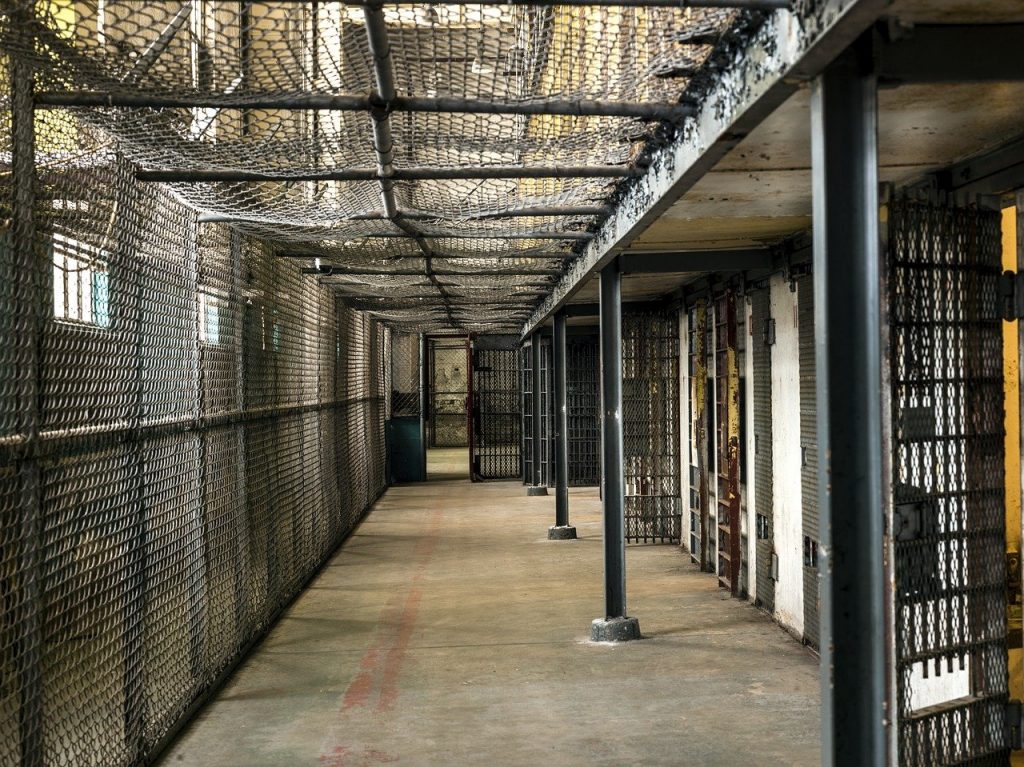
A recent poll by the National Opinion Research Centre revealed that 95% of Americans favour vital criminal justice reforms. This is hardly surprising, given that several people of varying racial, partisan and ideological dispositions have called out the justice system over its many failures throughout the years. Most Americans received the Trump Administration’s First Step Act as a step in the right direction, as about 60% of people approved the criminal justice reform bill according to a 2018 poll. However, many people still believe the justice system’s approach to crime is ineffective and needs dire change, and these are some reasons why.
Prison population and funding concerns
Research conducted revealed America has about 2.3 million prisoners, making the US the country with the highest incarceration rate globally. Experts estimate that the country’s prison population has grown by a whopping 340% over the past three decades; new prisoner admissions into jails are higher than prisoner release numbers. The cost of maintaining the nation’s prisons at taxpayers’ expense has inspired a lot of backlash and calls for budget cuts. According to research, slashed correction spending was the preferred option by most states to balance their budgets and redirect spending to other areas.
Minimum mandatory sentences
Minimum mandatory sentences are statutes that force judges to give defendants convicted of a crime the minimum prison sentence. Mandatory sentences rob judges of the traditional way of considering the defendant’s character and the unique circumstances surrounding offences. Even when represented by criminal defense attorneys with many years’ experience, defendants often succumb to prosecutors’ pressure to plead guilty or face more severe charges with higher mandatory sentences. The guilty plea bargain consequently resolves about 95% of both federal and state court cases. Research also shows that about half of inmates in federal prisons are doing time for drug offences- causing overpopulation in the prison system.
Growing number of people killed by the police
An estimated 1000 civilians are killed by police officers annually in the US. The frequency of police brutality cases over the years requires immediate reform to the American justice system. Data suggests that the incidence of fatal police shootings is higher among African-Americans than any other ethnicity, inspiring movements like the ‘Black Lives Matter’ campaign to press on with protests for significant police etiquette reforms towards coloured minorities. The police force faces incessant accusations of racial profiling, indiscriminate use of power, and poor discretion, which has led a reported 58% of Americans to think policing needs major reforms through measures like better-trained officers, and wearing body cameras.
Evolving public opinion on crime
Research released by the Sentencing Project and The Justice Policy Institute reveals that more people in conservative states are embracing preventive, rehabilitative, and alternative sentencing options for non-violent offenders. Most Americans now view the prevention of crime as the most vital function of the justice system, as 77% of Americans think that focusing more on character education and after-school programs would be cost-effective by reducing the number of people going to jail. Almost two-thirds of Americans also believe in the need for lighter sentences with more useful, reformative programs in prisons that will benefit inmates upon release. Therefore, support for harsh penalties that harden criminals and make them a more significant menace when reintroduced into society has dwindled.
Opinion
The History Question: Is It Better to Remember or to Forget?
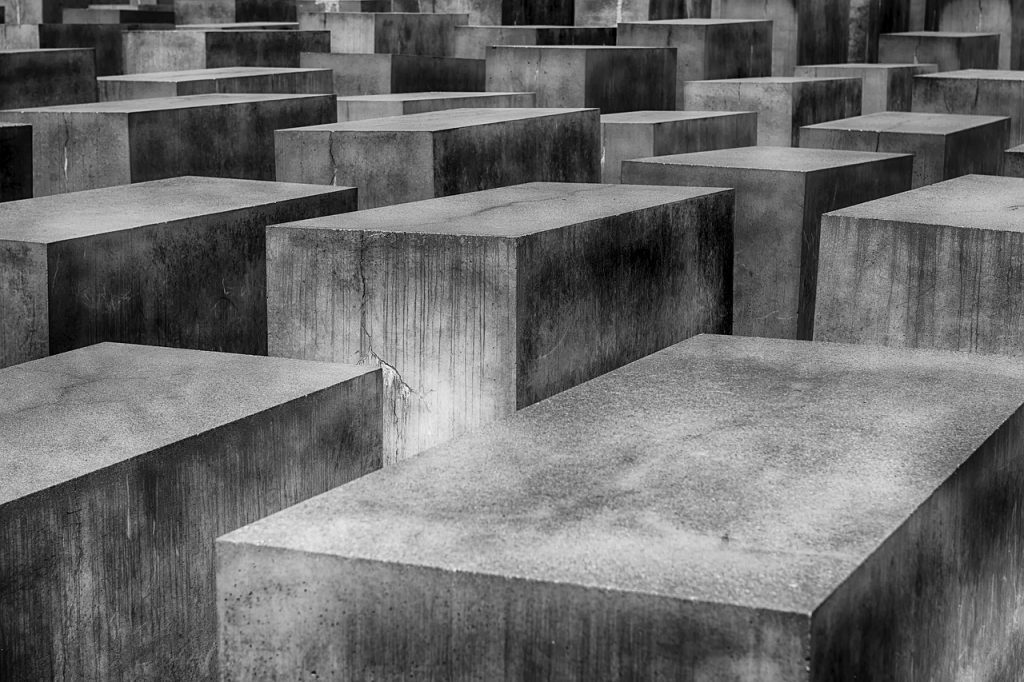
Years ago, a philosopher by the name of George Santayana said a phrase that fuels many debates to this day. His original saying is “those who cannot remember the past are condemned to repeat it”, although, many sources now present it as variations of “those who cannot learn from history are doomed to repeat it”. The latter definitely has more substance to it in the light of the ongoing debate about how much history we should be learning and how.
Is It Better to Remember or Forget About the Past?
On one hand, Santayana was right. Learning about the past is essential in order for people to progress. One also shouldn’t overlook the importance of remembrance and paying respects to the dead, both those who pushed the progress forward and those who have fallen victims to major tragedies that could and should have been averted.
The main argument in favor of learning about the past is that its knowledge is necessary for preventing the same thing happening in the future. Having it one can see the signs and stop the tragedy before it gains momentum.
That’s sound in theory, but the reality is always different. For example, today people are surely forgetting, and the much-critiqued education system is only partially at fault here. Even the greatest of tragedies weren’t spared this fate. It’s a proven fact that about two-thirds of millennials today don’t know about the Holocaust, and this number is surely greater for generations that follow them. In the school history course, the subject of one of the greatest disasters in history is barely touched, if touched at all. And outside of a history classroom, one can only see small, but terrifying, glimpses of it at the Holocaust Museum and other museums that rarely attract many visitors. And now we are witnessing a rise of antisemitic crime.
Are these two facts related? Does the lack of awareness about the horrors done in the name of Aryan supremacy contribute to the fact that right-winged extremists seem to be gaining popularity again?
It does, but by how much? That is the question that no one can truly answer.
And what about other genocides? The Holocaust had the highest death toll, but it was far from the only genocide in history. And quite a few of those happened after World War 2 and before the memory of the atrocities against the Jews began to fade. This means that while forgetting history is a factor, it’s not the deciding factor in its repeats.
But what is that thing responsible for the reenactment of past mistakes and tragedies?
Learning. This is the important thing that is most often overlooked when citing Santayana’s famous saying. It’s not enough to learn about the past and know the facts of things that happened. It’s important to learn from those facts and put in place protections that will prevent them from happening again. And this is something that humanity, as a whole, has yet to succeed in doing.
Dwelling in the Past Can Be Just As Bad
One also shouldn’t forget that there is such a thing as “too much history”. The Bosnian War and genocide that happened there in the 1990s is a vivid example of how the past can be exploited by political powers. Used as a part of propaganda, which fueled the war, history can become a weapon in the hands of those who want to use it for their own goals.
And this is what humans have been doing since the dawn of time. There is always someone who will use any means necessary to achieve whatever it is they wish. This results in wars and genocides, and hundreds of smaller but no less devastating tragedies.
Therefore, the problem isn’t whether people should be learning history but human nature itself. Perhaps, teaching this can help fix this fundamental flaw and truly stop the worst of the past from repeating.
-

 Business11 months ago
Business11 months agoHow To Future-Proof Your Business With The Right Tools
-

 Travel9 months ago
Travel9 months agoTravelling from San Antonio to Guadalajara
-

 Business12 months ago
Business12 months agoWhat are EDC products, and why should you always have them?
-

 Travel6 months ago
Travel6 months agoTravel wellness tips for a healthier and more enjoyable journey
-

 Europe4 months ago
Europe4 months agoRecent Books by Boaventura de Sousa Santos: Law, Colonialism, and the Future of Europe


